 We (Edith Hope Fine and Judith Josephson) are the Grammar Patrol. Both of us taught for years and are now writers, with thirty plus books between us, including our two popular grammar guides, Nitty-Gritty Grammar and More Nitty-Gritty Grammar. For close to twenty years, we taught writing and grammar basics and now we blog about grammar for writers.
We (Edith Hope Fine and Judith Josephson) are the Grammar Patrol. Both of us taught for years and are now writers, with thirty plus books between us, including our two popular grammar guides, Nitty-Gritty Grammar and More Nitty-Gritty Grammar. For close to twenty years, we taught writing and grammar basics and now we blog about grammar for writers.
Heads up! Sharpen those number two pencils. Time for a pop quiz covering previous Grammar Patrol columns.

Puzzled? Click on the links to our 2013 blog posts with more info for each question.
Can you spot the errors in these sentences in less than a minute?
On your mark. Get set. Go!
1. Felix was the man who Oscar called.
Who or Whom? A Writer’s Dilemma
2. Your help means a lot to my friend and I.
Put Out a BOLO [Be on the Lookout] on Pronoun Agreement
3. My favorite show is “The Big Bang Theory.”
4. Sign: Holiday Wreath’s, $10
Apostrophes: Flowers or Weeds?
5. Magazine Cover: Let the Caribbean Peak your Interest.
6. “I feel nauseous,” said LaVon, who overindulged on Thanksgiving.
A Baker’s Dozen of Word Switcheroos
7. A musician must practice their instrument.
Put out a Bolo [Be on the Lookout] on Pronoun Agreement
8. My sweet Jonathan can be a rebel rouser.
Idioms, Malapropisms and Other Funny Expressions
9. Romeo’s and Juliet’s romance was doomed.
Apostrophes: Flowers or Weeds?
10. Who made this song famous—“Hello Dolly?”
Quotation Mark Questions? Think Symphony Orchestra.
11. Galloping around the corner, the castle loomed on the hill.
Dangling Participial Phrases Can Cause Confusion
12. Luella was on a journey of self discovery to become more well-rounded.”
Hyphens: Part I and II
How did you do? (You’re not being graded!)
Here are the fixes for these common errors:
1. whom 2. me 3. Big Bang Theory (italicized) 4. wreaths 5. Pique (Tip: Check out peek, peak, pique.) 6. nauseated 7. his or her, depending on musician’s gender. 8. rabble 9. Romeo and Juliet’s 10. Dolly”? (Louis Armstrong) 11. A galloping castle? Rewrite: “. . . corner, I saw the castle looming. . .” 12. self-discovery, well rounded.
Win More Nitty Gritty Grammar
Good holidays to you all from the Grammar Patrol! For much, much more on these sticky wickets, see our in-depth A-Z grammar guide, More Nitty-Gritty Grammar. Rumor has it that Santa calls it a great stocking stuffer.
To win a free copy of More Nitty Grammar, enter the raffle by posting your quiz score and listing the questions you missed in the comments section. If you earned 100%, post your score and a grammar blog post suggestion for 2014. Everyone will be entered and the winning number will be selected randomly by the Grammar Patrol. Entries due by Saturday, December 14. Winner will be contacted directly and announced on Tuesday, December 17.
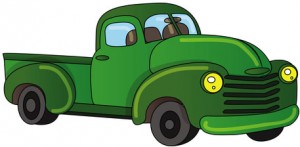

 Word mix-ups can flummox even people who work with words daily.
Word mix-ups can flummox even people who work with words daily. Isn’t dangling for earrings, bungee jumpers, or grapes on the vine?
Isn’t dangling for earrings, bungee jumpers, or grapes on the vine?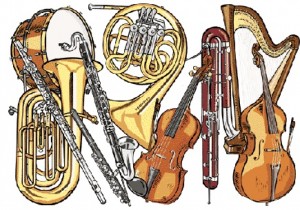 Take a moment to think of soothing music. In a symphony orchestra, some instruments, like second violins and bass violins, are workhorses. They do their jobs and follow the rules. But some all-stars take the spotlight. Oboes sound that pivotal “A” for tuning. Trumpets announce themselves. Ta-da!
Take a moment to think of soothing music. In a symphony orchestra, some instruments, like second violins and bass violins, are workhorses. They do their jobs and follow the rules. But some all-stars take the spotlight. Oboes sound that pivotal “A” for tuning. Trumpets announce themselves. Ta-da! The Grammar Patrol loves Frazz, the erudite cartoon strip by the Jef Mallett. In one, a student tells Frazz, the school custodian, “Violets are like flowers in the right place, and weeds in the wrong place. Like apostrophes!”
The Grammar Patrol loves Frazz, the erudite cartoon strip by the Jef Mallett. In one, a student tells Frazz, the school custodian, “Violets are like flowers in the right place, and weeds in the wrong place. Like apostrophes!” The same goes for the mailbox that says “The Smith’s.” That’s two bloopers in just one sign. First, “Smith” is singular. “Smiths” is plural—more than one Smith lives there. An apostrophe added correctly (as in “The Smiths’ ”) shows possession. But why use the possessive? The Smiths’ what? The Smiths’ mailbox? Keep it simple. The sign should read “The Smiths” as in “the Smiths live here.”
The same goes for the mailbox that says “The Smith’s.” That’s two bloopers in just one sign. First, “Smith” is singular. “Smiths” is plural—more than one Smith lives there. An apostrophe added correctly (as in “The Smiths’ ”) shows possession. But why use the possessive? The Smiths’ what? The Smiths’ mailbox? Keep it simple. The sign should read “The Smiths” as in “the Smiths live here.” That’s when Miss Hoezel, her English teacher, donned her blue grammar cape and flew to the rescue. As the Grammar Patrol, we’ve used her clever trick many times when teaching grammar basics. We call it the arrow method.
That’s when Miss Hoezel, her English teacher, donned her blue grammar cape and flew to the rescue. As the Grammar Patrol, we’ve used her clever trick many times when teaching grammar basics. We call it the arrow method.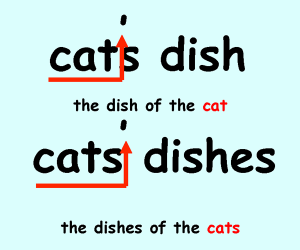
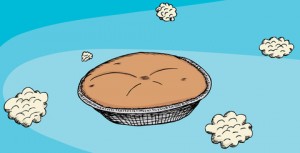
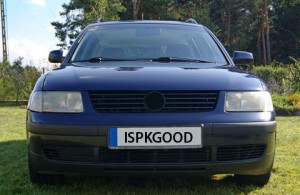 In Perfect Grammar Land, you’d hear, “Put out a BOLO for a blue station wagon, license ISPKGOOD.” We want you to put out a BOLO on agreement bloopers when prepositions pair with incorrect pronouns. Such errors abound, especially in speech and on TV and radio shows.
In Perfect Grammar Land, you’d hear, “Put out a BOLO for a blue station wagon, license ISPKGOOD.” We want you to put out a BOLO on agreement bloopers when prepositions pair with incorrect pronouns. Such errors abound, especially in speech and on TV and radio shows.
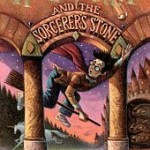 Let’s face it. Sometimes you just have to memorize the rules. If memorization isn’t your forte (and yes, we still say “fort,” but dink around on the Internet: the two-syllable “for-tay” is on the rise and no longer considered incorrect), we suggest consulting your favorite grammar book. Might we suggest our Nitty-Gritty Grammar or More Nitty-Gritty Grammar. (True confession: We both keep these grammar guides handy, especially for rules surrounding today’s topic.)
Let’s face it. Sometimes you just have to memorize the rules. If memorization isn’t your forte (and yes, we still say “fort,” but dink around on the Internet: the two-syllable “for-tay” is on the rise and no longer considered incorrect), we suggest consulting your favorite grammar book. Might we suggest our Nitty-Gritty Grammar or More Nitty-Gritty Grammar. (True confession: We both keep these grammar guides handy, especially for rules surrounding today’s topic.)